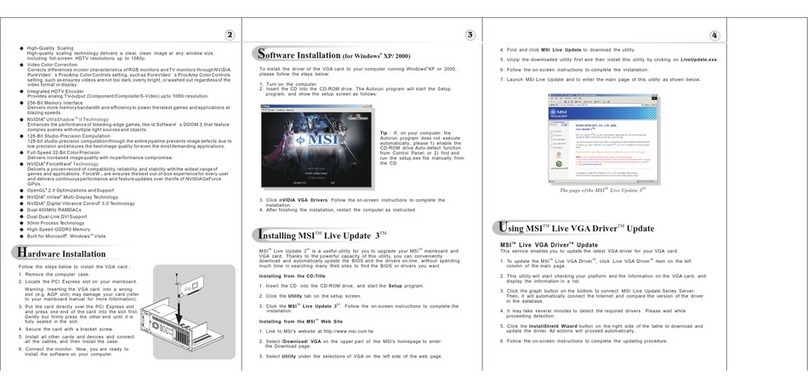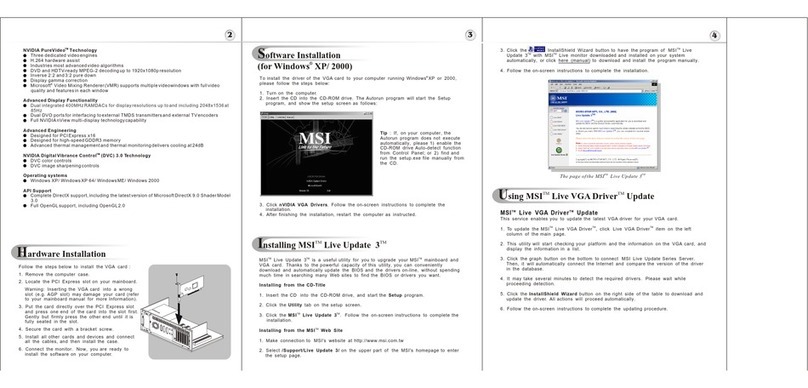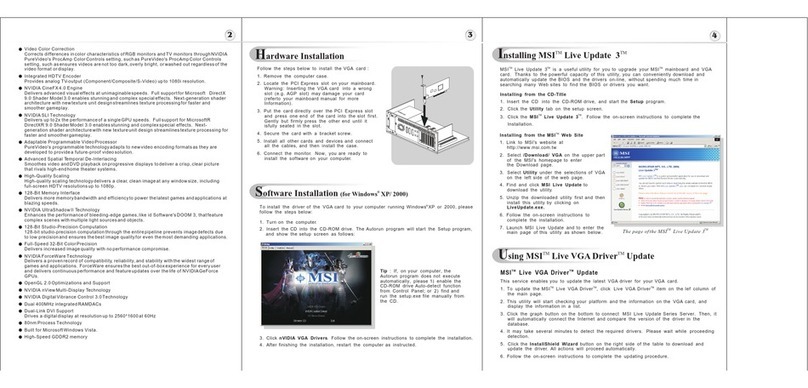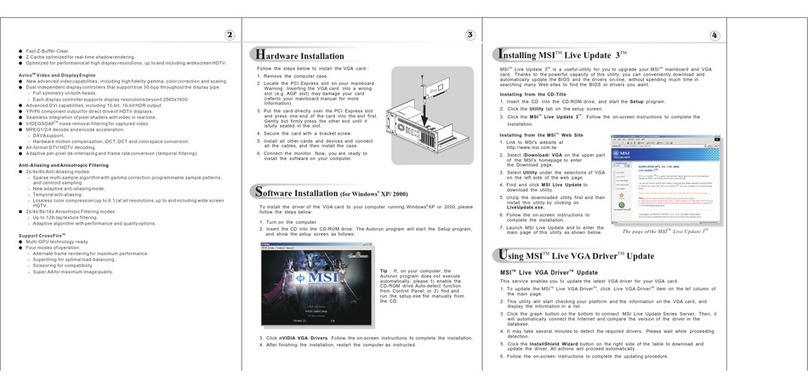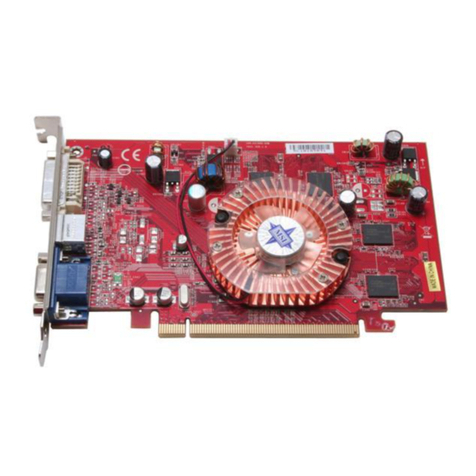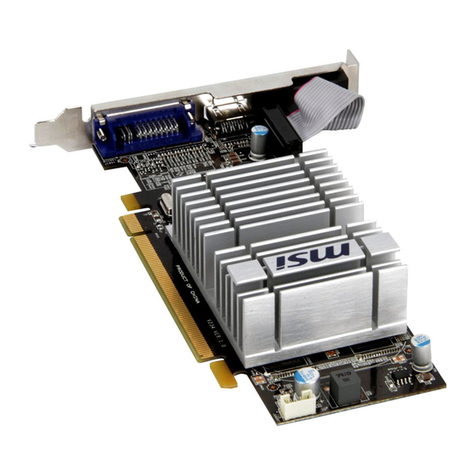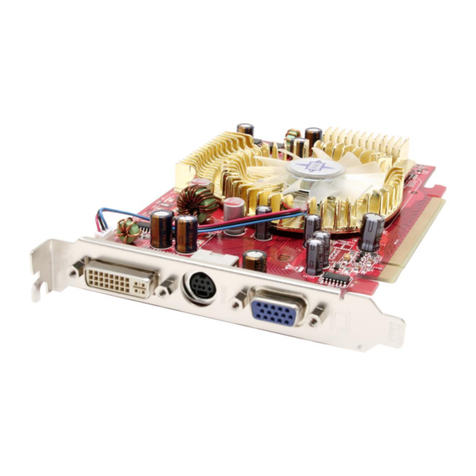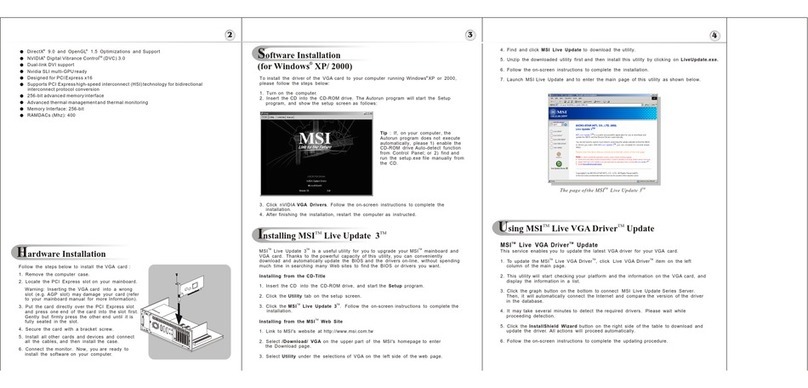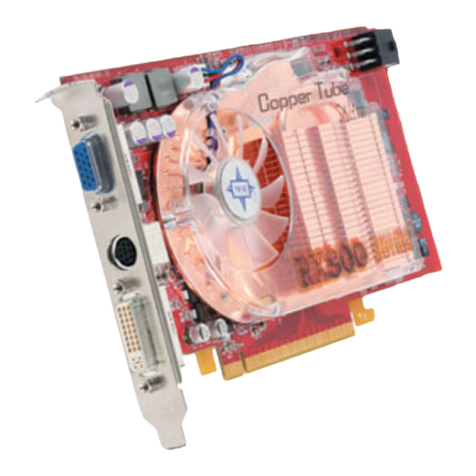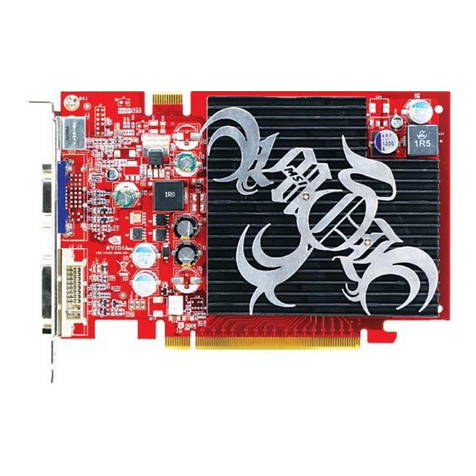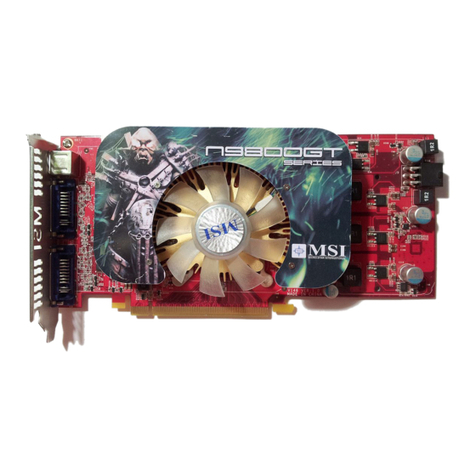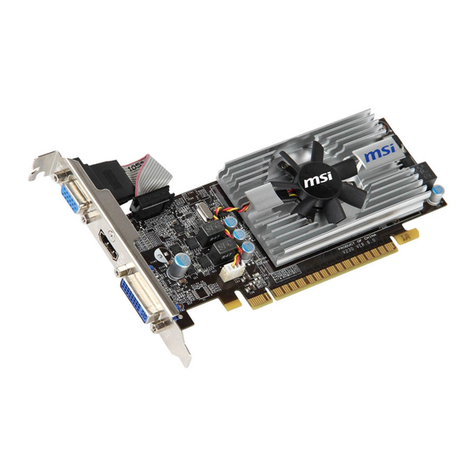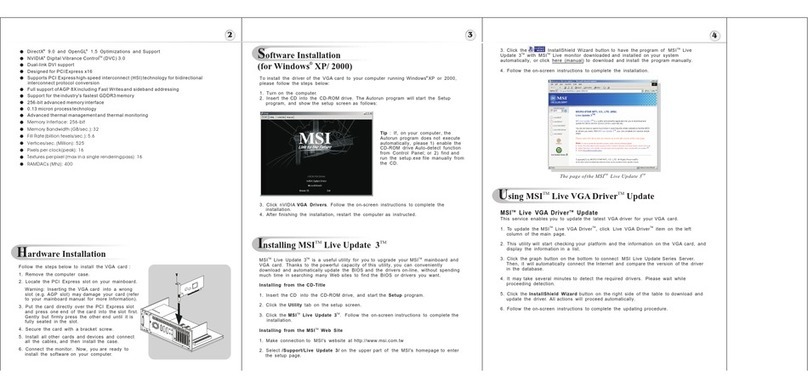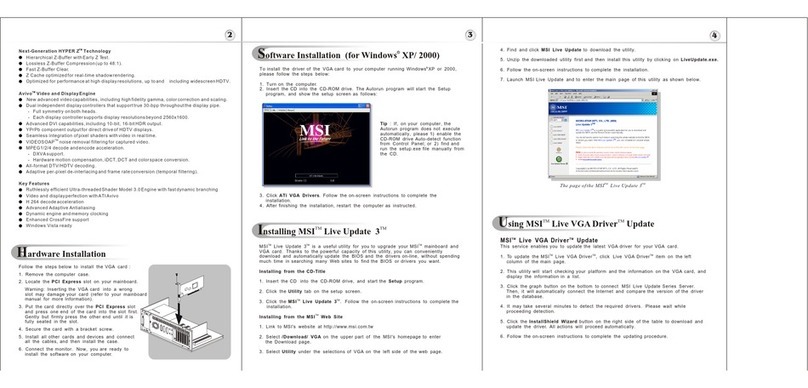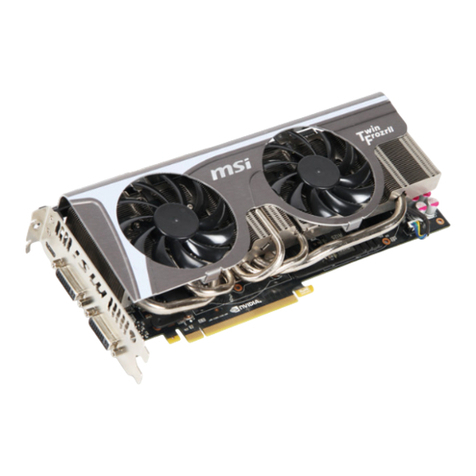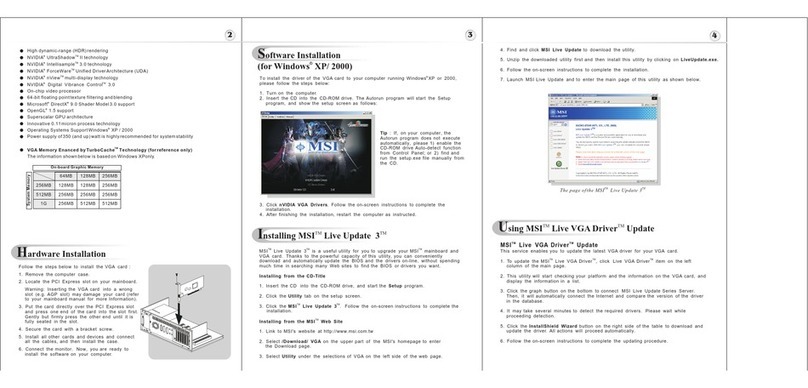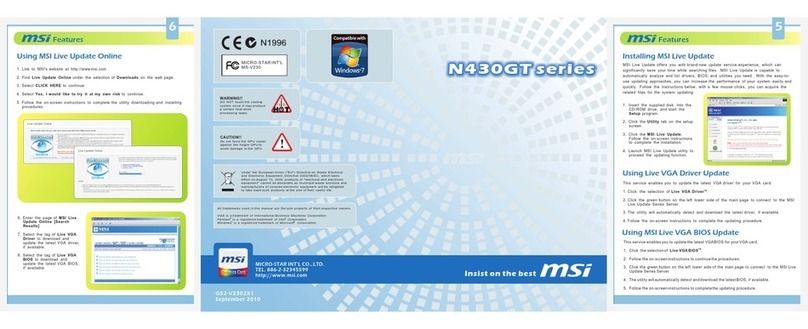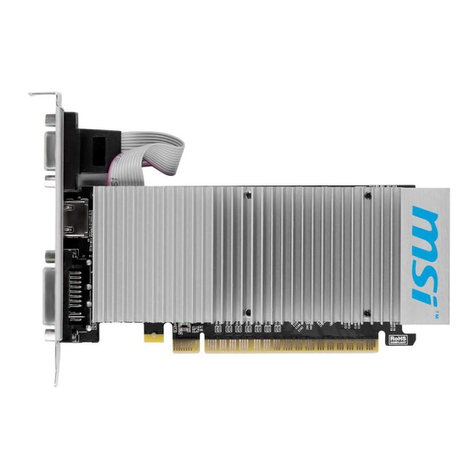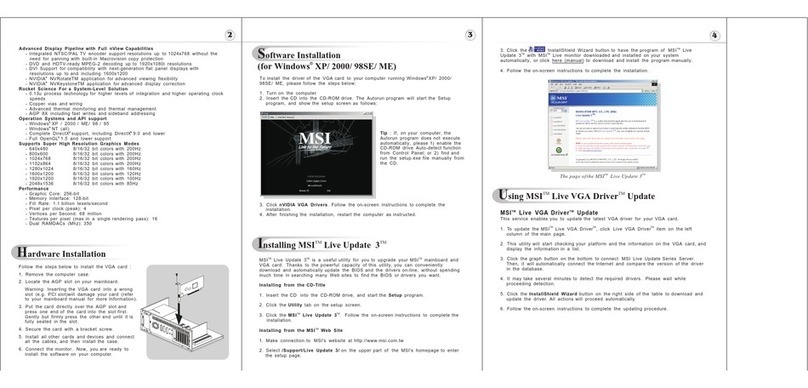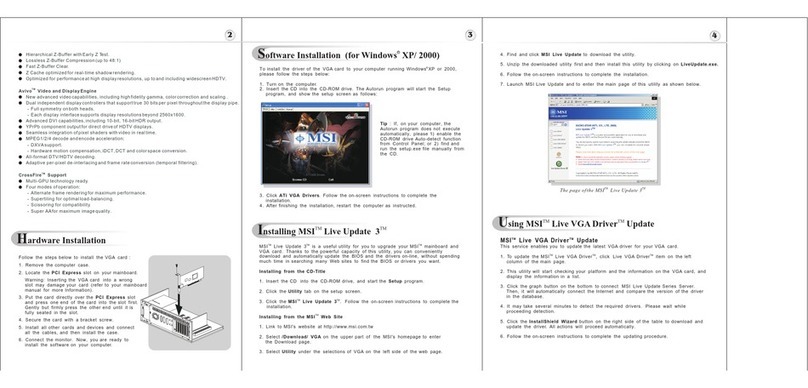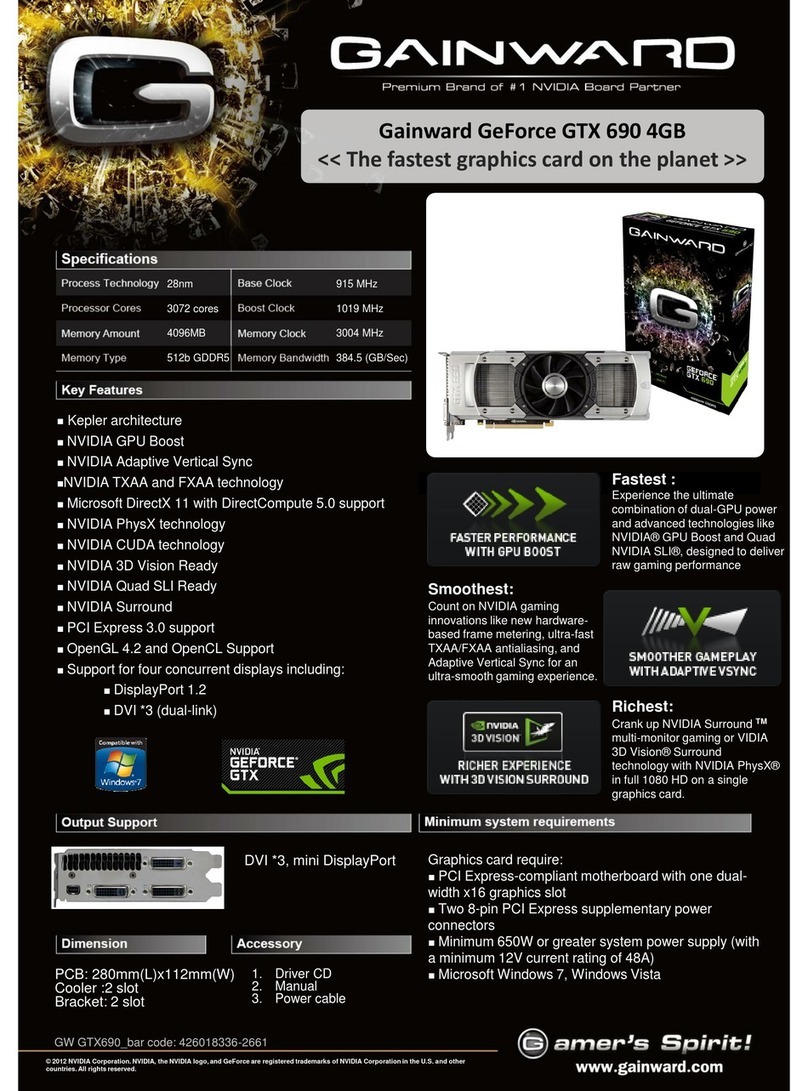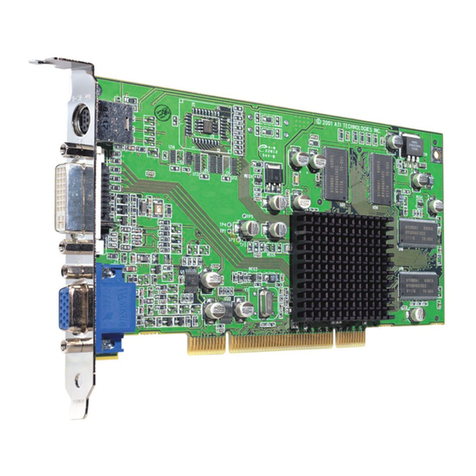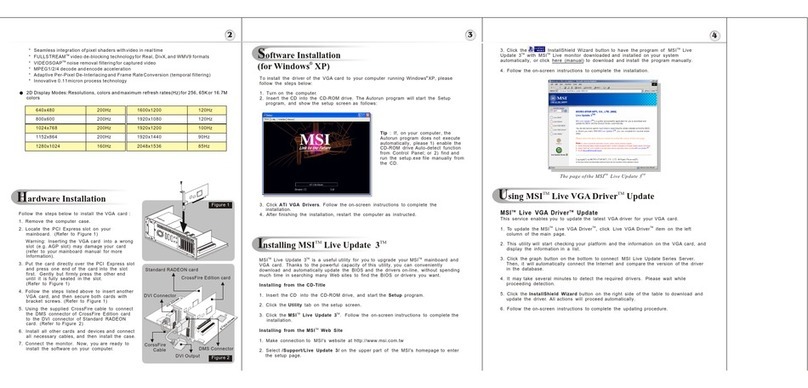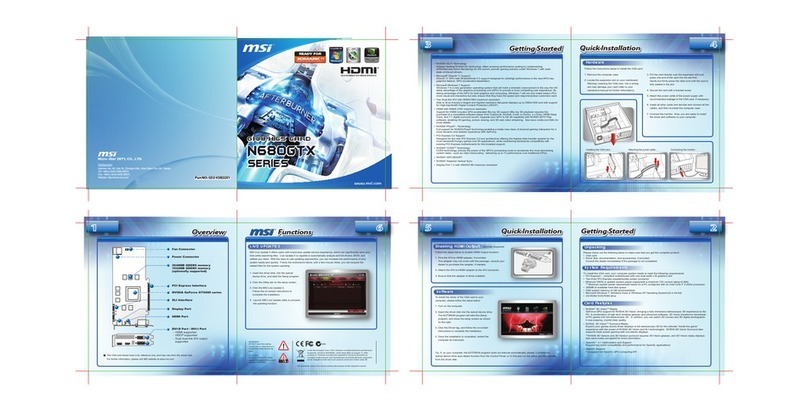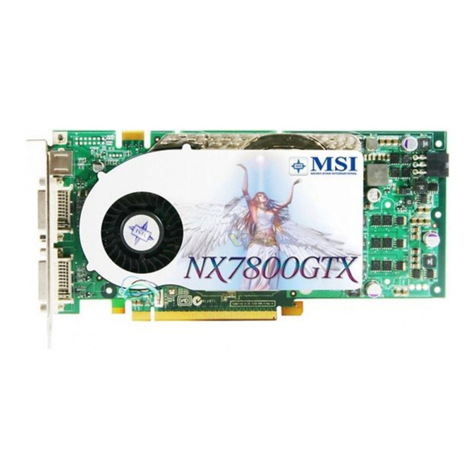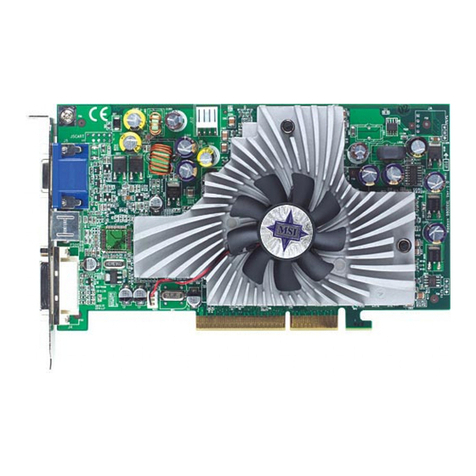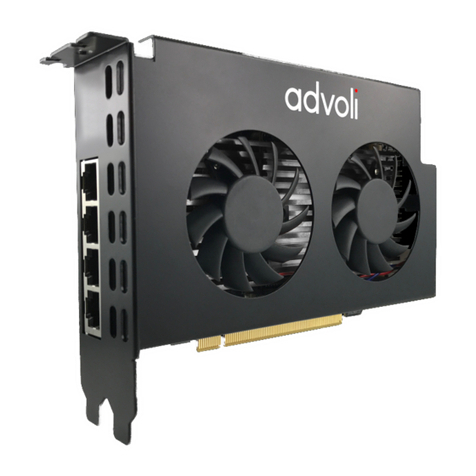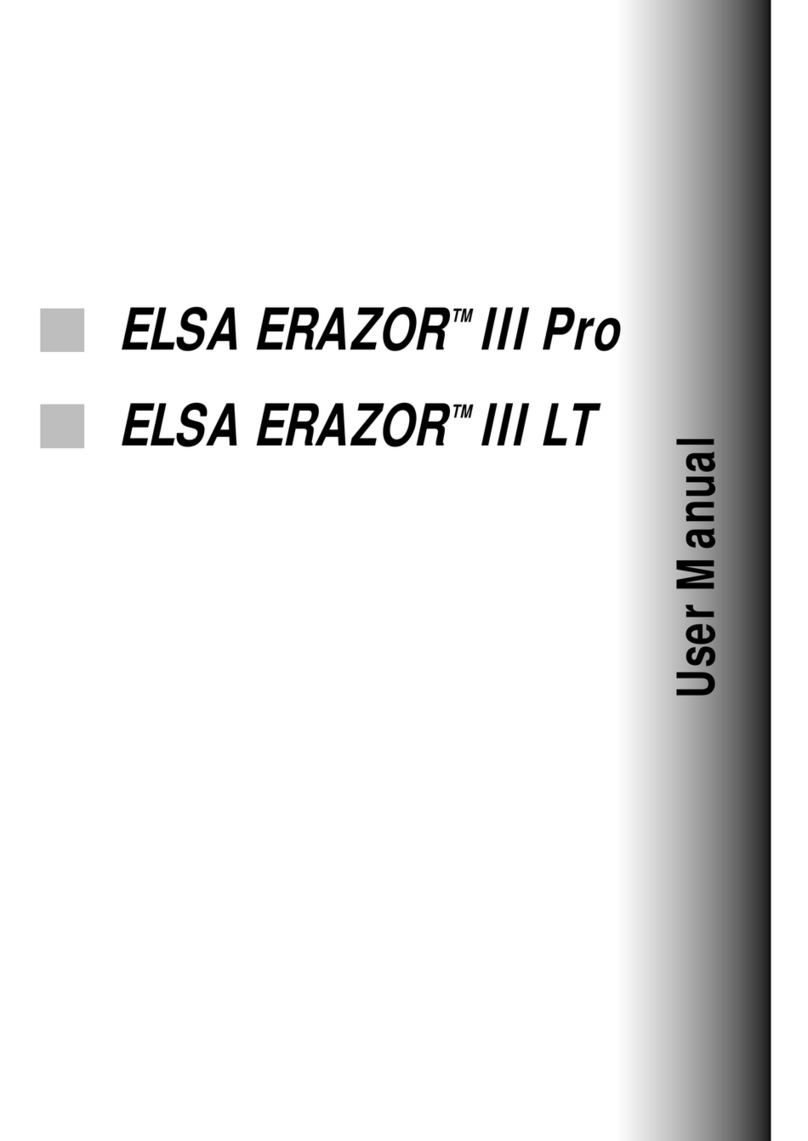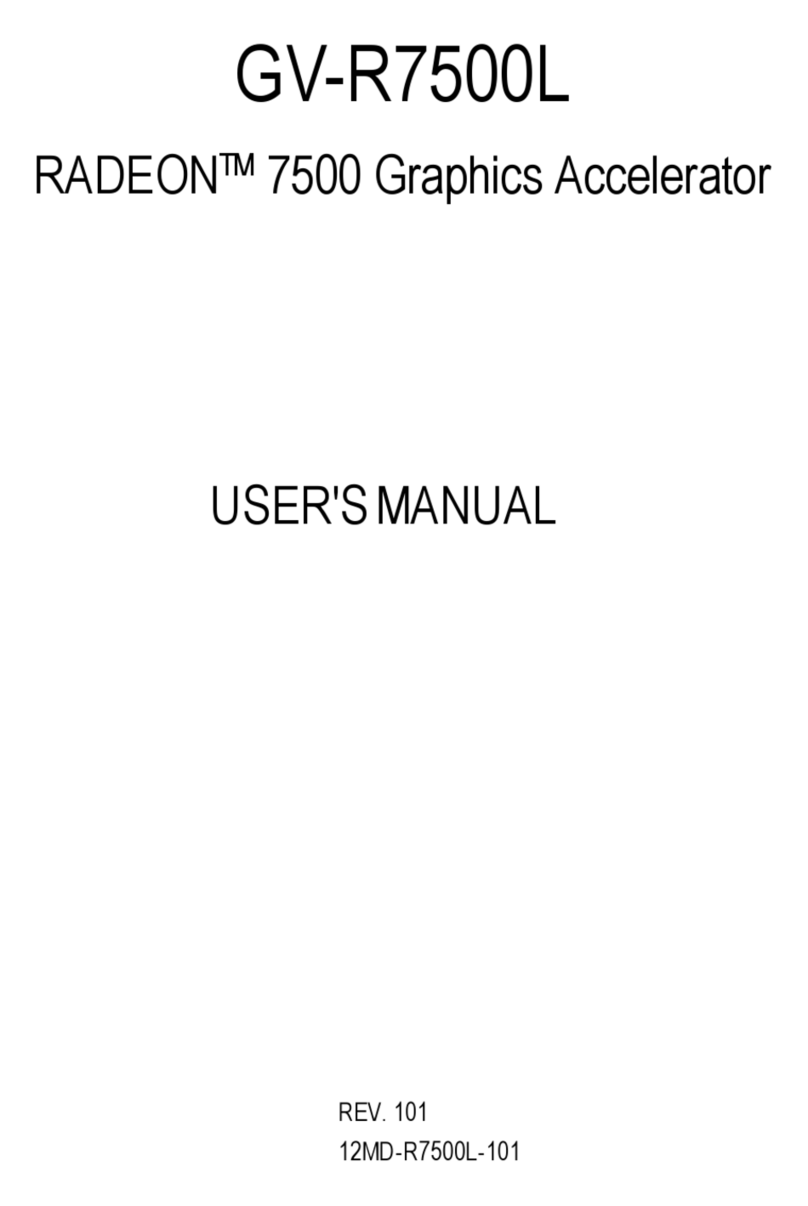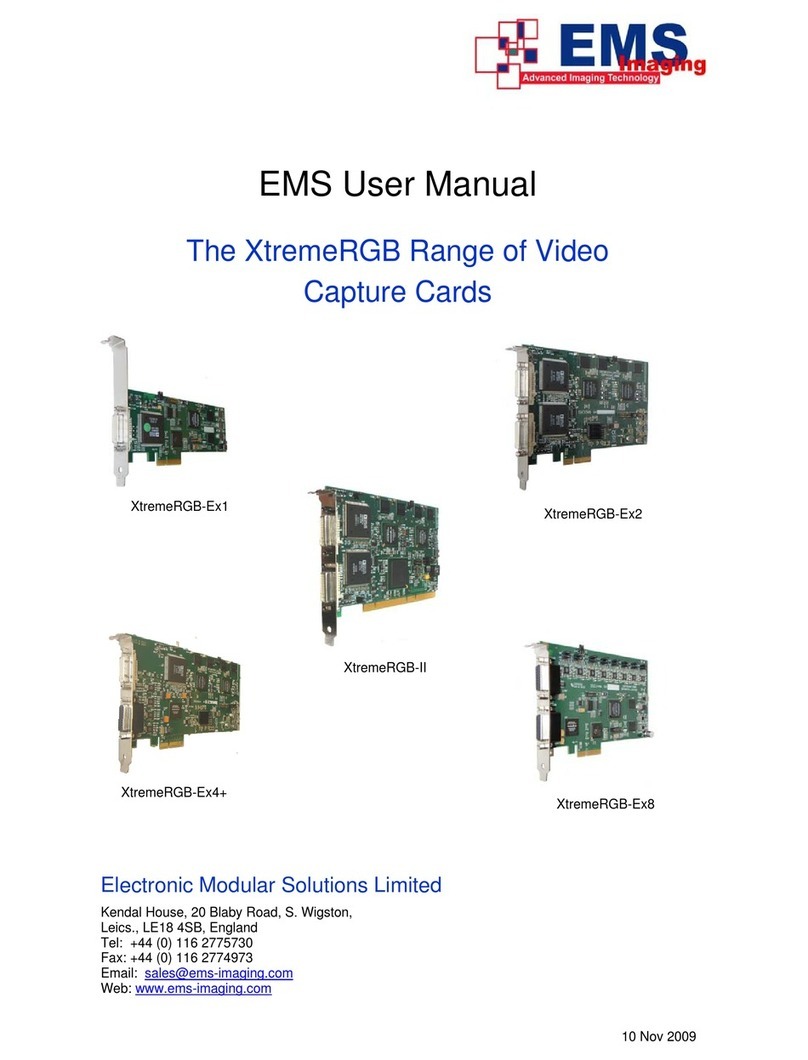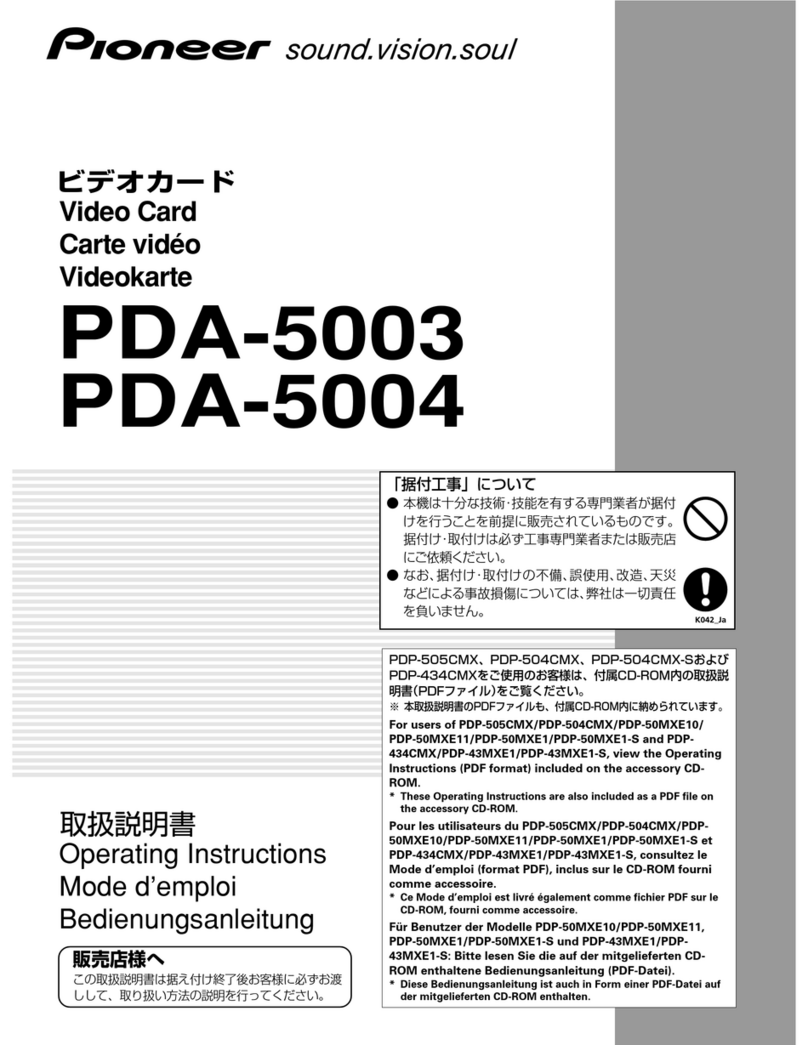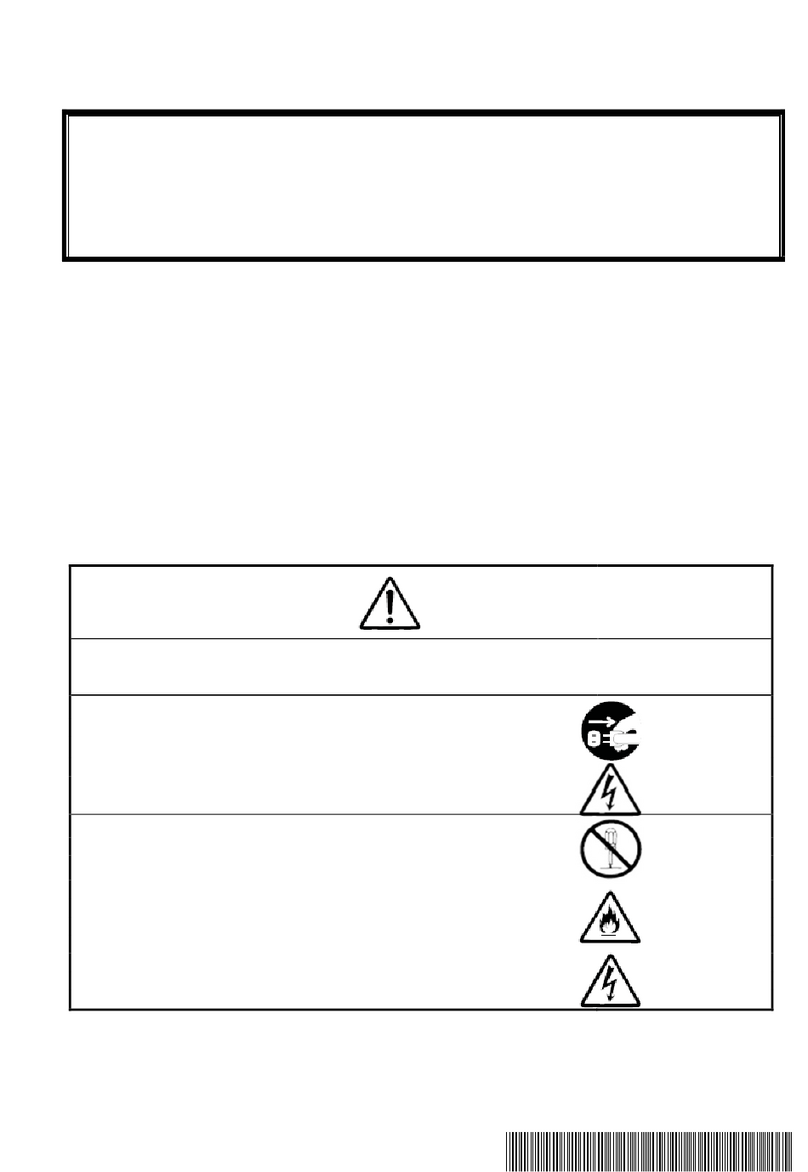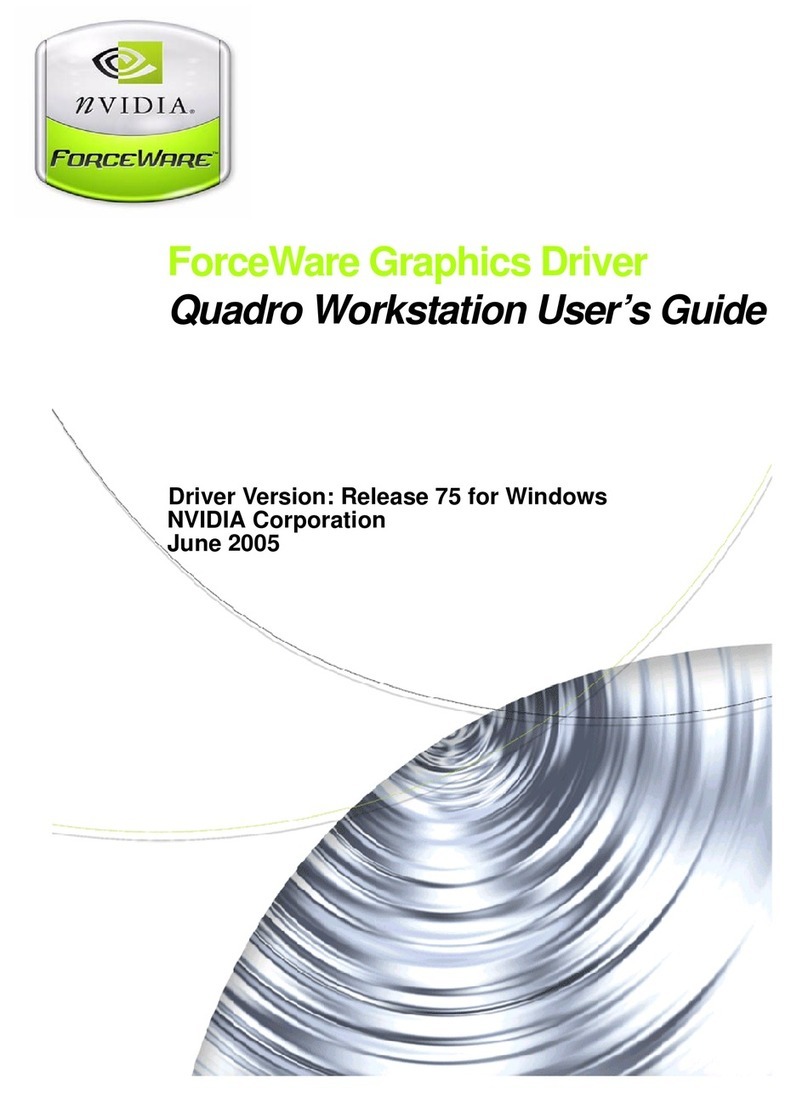Hardware
TM TM
Installing MSI Live Update 3
Quick Installation
4
Follow the steps to install the VGA card:
1. Remove the computer case.
2. Locate the expansion slot on your mainboard.
Warning: Inserting the VGA card into a wrong
slot may damage your card (refer to your
mainboard manual for more Information).
3. Put the card directly over the slot and
press one end of the card into the slot first.
Gently but firmly press the other end until the
card is fully seated in the slot.
4. Secure the card with a bracket screw.
5. Install all other cards and devices and connect
all the cables, and then install the case.
6. Connect the monitor. Now, you are ready to
install the software on your computer.
below
expansion
To install the driver of the VGA card to your computer,
CD
please follow the steps below:
1. Turn on the computer.
2. Insert the into the CD-ROM drive. The Autorun program will start the Setup
program, and show the setup screen as follows:
Tip : If, on your computer, the
Autorun program does not execute
automatically, please 1) enable the
CD-ROM drive Auto-detect function
from Control Panel; or 2) find and
run the setup.exe file manually from
the CD.
3. Click nVIDIA VGA Drivers. Follow the on-screen instructions to complete the installation.
4. After finishing the installation, restart the computer as instructed.
Software R
Getting Started 2
System Requirements
Card Features For reference only
Unpacking
Please check out the following items to make sure that you get the complete product:
VGA card
Disk: Drivers, documentation, and applications
Consult your dealer immediately if anything is missing or damaged.
To install the VGA card, your computer system needs to meet the following requirements:
Intel Pentium III (and above), AMD K7 (and above), or compatible with expansionslot
128MB of system memory
Installation software requires CD-ROM drive
Operation System Support: visit MSI website for further information
Power supply of 350 (and up) watt is highlyrecommended for system stability
TM
RRR
3Getting Started
1
Overview
Note: The VGAcard shown here may vary from the actual card.
For further information,please visit MSIwebsite at www.msi.com.tw
TV_Out Connector
HDTV-Output integrated
PCI Express Interface
DVI-I Port
512MB DDR3/DDR2 memory
256MB DDR3/DDR2 memory
128MB DDR3/DDR2 memory
nVIDIA GeForce 8400GS
NVIDIA CineFX .0
TM Shading Architecture
TM
Microsoft Vista Features
-
-
-
-
-
-
Vertex shaders
- Support for Microsoft DirectX 10.0 Vertex Shader 4.0
- Encompass' Transform and Lighting
- Displacement mapping
- Geometry instancing
Pixel shades
- Support for DirectX 10.0 Pixel Shader 4.0
- Support for full pixel branching
- Support for Multiple Render Targets (MRTs)
- Infinite-length pixel programs
Next-generation texture engine
Full 128-bit studio-qualityfloating point precisionthrough the entire rendering pipeline,with
native hardware supportfor 32 bpp,64bpp,and 128 bpp rendering modes.
64-Bit TextureFiltering and Blending
Full floating pointis supported throughoutentire pipeline
Floating point filteringimproves the qualityof images in motion
Floating point texturingdrivers new levelsof clarity and image detail
Floating point framebuffer blending givesdetail to special effects like motionblur and
explosions
5
Next-generation Instancing
Geometry Shaders
Steamed Output
8 MRTs
32bpp HDR Formats
Shadow Maps
R
R
TM
NVIDIA Intellisample 4.0 Technology
Advanced 16X anisotropicfiltering (up to128 taps)
Rotated-grid antialiasing for removing jagged edgesfor incredible edge quality
Support for advancedlossless compression algorithmsfor color,texture,and z-data at higher
resolutions and frameretes
Fast z-clear
Support for normalmap compression
New transparent supersampling and transparent multisamplingantialiasing modes
TM
NVIDIA PureVideo Technology
Three dedicated videoengines
MPEG-2 HD andWMV HD videoplayback up to 1920 X1080p resolution
H 264 hardwaredecode acceleration
Decryption supported forall standard HDVideo formats-AES-128 CTR mode,AES-128 CBC
mode,and AES-128ECB mode.
Industry's most advancedvideo algorithms
Overlay color temperaturecorrection
Microsoft Video MixingRenderer (VMR) supportfor multiple video windows with fullvideo
quality and featuresin each window
Integrated HDTV output
Advanced Display Functionality
Dual integrated 400MHzRAMDACs for displayresolutions up to and including 2048 X 1536
at 85 Hz
Dual MIO portsfor interfacing toexternal TMDS transmitters and external TVencoders
Full NVIDIAnView multi-display technologycapability
Advanced Engineering
Designed for PCIExpress X16
API Support
Complete DirectX support,including the latest versionof Microsoft DirectX 10.0 Shader
Model 3.0
Full OpenGL support,including OpenGL2.0
**
SPDIF Connector
D-Sub Port
Fan Connector
**
Reserved Hole
**
Refer to thesection of EnablingHDMI Output
to enable theHDMI function.
Enabling HDMI Output
Follow the steps to enable HDMI Output
function:
1. Find the DVI-to-HDMI adapter that comes with
the package, if provided.
2. Attach the
3. Ensure that the adapter is firmly installed.
below
Consult your dealer
to purchase the adapter if it is not provided.
DVI-to-HDMI adapter to the DVI
connector.
4. Use the compliant SPDIF Internal cable to connect both the SPDIF connectors on the
VGA card and your mainboard. Make sure to (1) plug the orange cable to the SPDIF-
pin and the black one to the GND-pin on the mainboard; and (2) plug the other end
(2-pin white connector) of the cable to the SPDIF connector on the VGA card. Note
that wrong installation may cause the damage to the VGA card.
5. Or, use the compliant SPDIF External cable to connect the SPDIF connector on the
VGA card and the SPDIF-out connector on the back panel of the mainboard. Make sure
to plug the end with 2-pin connector of the cable to the SPDIF connector on the VGA
card, and the other end to the SPDIF-out connector on the back panel of the mainboard.
